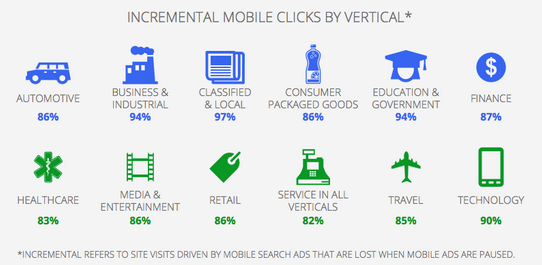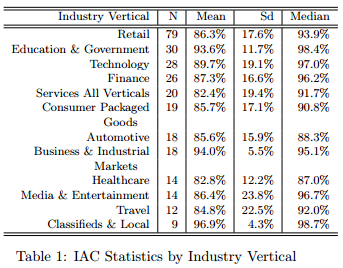Google Study: Mobile PPC Ads Also Do Not Cannibalize Organic Traffic
Google released a new study as part of its series of analysis aimed at answering the perpetual question of whether PPC ads cannibalize organic traffic. You know the question: “If I’m already ranking, why should I pay for ads if they are just going to steal free clicks from my organic listings?” This time, Google’s […]
 Google released a new study as part of its series of analysis aimed at answering the perpetual question of whether PPC ads cannibalize organic traffic. You know the question: “If I’m already ranking, why should I pay for ads if they are just going to steal free clicks from my organic listings?” This time, Google’s research focuses specifically on the impact of mobile search ads on mobile organic traffic.
Google released a new study as part of its series of analysis aimed at answering the perpetual question of whether PPC ads cannibalize organic traffic. You know the question: “If I’m already ranking, why should I pay for ads if they are just going to steal free clicks from my organic listings?” This time, Google’s research focuses specifically on the impact of mobile search ads on mobile organic traffic.
The study found that, on average, mobile ads provide an 88 percent lift in mobile search clicks — 88 percent of users that clicked on your mobile ad would not have clicked on your organic listing if your ads had been paused. In other words, mobile PPC ads don’t cannibalize your mobile organic traffic.
This finding is nearly identical to the original 2011 study that looked at all search traffic and found search ads offered an 89 percent lift in clicks.
Google conducted the Mobile Incremental Ad Clicks (IAC) study for a year — from March 2012 to April 2013 — looking at 327 U.S. AdWords accounts across 12 verticals.
The research team looked for sharp changes in mobile ad spend and then analyzed the number of clicks that were gained or lost as a result of the change in spend. It also looked at the change in organic traffic as a result of a drop in paid search spend and whether an advertiser’s organic traffic made up for the loss in paid clicks after a significant cut in ad spend.
Here is the average IAC by vertical:
Below is the more detailed extract from the full whitepaper that includes the number of studies (N) included in each vertical, the average IAC (Mean), standard deviation and median IAC. The overall median IAC was 96 percent. According to the study, over 63 percent of the studies had an IAC value above 90 percent.
It’s clearly no coincidence this white paper by Shaun Lysen, a quantitative marketing statistician at Google is being released in a post by Google’s head of global mobile search solutions as the automatic switch to enhanced campaigns is just 7 days away. However, that’s not reason to discount the study outright. It’s clearly a rigorous data analysis.
Unlike the 2011 study, the research team conducting the mobile ads research focused on search terms that had an organic listing on the first page and also adjusted for factors like seasonality.
Lysen notes that the study does not look at the incremental impact on conversions or revenue and acknowledges that the exact organic position of the keyword among other factors can impact IAC, but holds that “given the large volume of studies produced, across multiple industry verticals, our analysis does provide a reasonable cross section of expected IAC.”
When Google’s original “Search Ads Pause Studies” came out in 2011, Matt Van Wagner wrote an extensive post on Google and others’ research into the incremental impact of search ads which I highly recommend reading.
Contributing authors are invited to create content for Search Engine Land and are chosen for their expertise and contribution to the search community. Our contributors work under the oversight of the editorial staff and contributions are checked for quality and relevance to our readers. The opinions they express are their own.
Related stories
New on Search Engine Land

